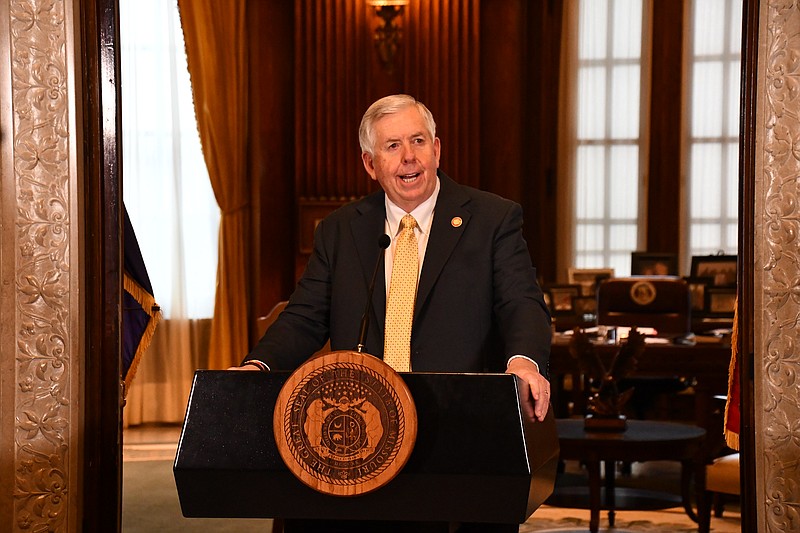Missouri Gov. Mike Parson announced Tuesday the state will stop participating in federal pandemic-related unemployment benefits June 12 in an attempt to get people back to work and address a critical labor shortage.
The six federal programs include a $300-per-week supplement to state-level benefits and were set to expire nationwide Sept. 6. The maximum amount of state benefits will drop from $620 a week to $320.
"While these federal benefits provided a necessary financial assistance during the height of COVID-19, they were intended to be temporary," Parson said. "Despite our economy's strong comeback, many business owners and employers are still struggling - not because of COVID-19 but because they can't find people to fill the jobs to help address this labor shortage."
Roughly 53,500 Missourians received extra weeks of unemployment aid thanks to federal aid in the last week of April, according to the latest available data.
Another 37,000 people who otherwise wouldn't qualify for regular unemployment help also claimed aid, according to a state labor department spokeswoman. That includes independent contractors, farm workers and people who are self-employed.
Parson said the state has recovered 70 percent of jobs lost to the pandemic and has 221,000 job openings. The Bureau of Labor Statistics reported a 4.2 percent March unemployment rate in Missouri and 128,900 unemployed workers - down from a peak rate of 12.5 percent in April 2020.
"Continuing these programs only worsens the workforce issues we're currently facing," Parson said. "It's time that we end these programs that have incentivized people to stay out of the workforce. This is an important step towards returning to normalcy and strengthening our economy."
Lt. Gov. Mike Kehoe echoed that sentiment.
"The jobs exist, and the demand exists, so there are plenty of opportunities for those who are inclined to think federal unemployment is the only option," he said in a statement.
Opponents of Tuesday's announcement say it isn't fair to workers and misplaces blame for the labor shortage.
Democratic House Minority Leader Crystal Quade said in a Tuesday statement that the free market, "not some federal boogeyman," is mostly to blame for the labor shortage. She said workers will return if they're offered more money, especially for jobs where the risk of exposure to COVID-19 is higher.
"If companies provide a livable wage, applicants will respond," she said. "The notion that Missourians are refusing to work so they can temporarily collect $300 a week is an offensive right-wing myth."
U.S. Rep. Cori Bush, a Democrat, called Parson's decision "cruel" in a statement.
"We cannot blame federal unemployment benefits for worker shortages," she said. "The only way our economy, our region and our country can heal from this pandemic is by treating workers with the dignity and respect they deserve, and that begins by paying them a living wage."
In ending federal benefits, Missouri follows other Republican-led states, including Alabama, Arkansas, Iowa, Mississippi, Montana and South Carolina. Some of those will terminate benefits at the end of June; others, like Missouri, will do so in the middle of the month.
President Joe Biden addressed the trend Monday, also arguing reducing benefits isn't the solution.
"The line has been, because of the generous unemployment benefits, that it's a major factor in labor shortages. Americans want to work," Biden said. "I think the people claiming Americans won't work even if they find a good and fair opportunity underestimate the American people."
Labor experts say the shortage is not just about the $300 payment. Some unemployed people also have been reluctant to look for work because they fear catching the virus. Others have found new occupations rather than returning to their old jobs. And many women, especially working mothers, have had to leave the workforce to care for children.
"Our economic recovery is nuanced, and many Missourians haven't been able to return to work because they still have children home from school, or jobs aren't available in their areas," Amy Blouin, president and of the Missouri Budget Project, said in a statement.
The nonprofit Missouri Budget Project analyzes state financial issues with an eye toward their impact on low-income residents.
In Parson's eyes, though, there isn't much of a debate:
"This is just more of a common-sense issue," he said. "We're looking for people to go to work, and it's time to go back to work."
The Associated Press contributed to this report.

